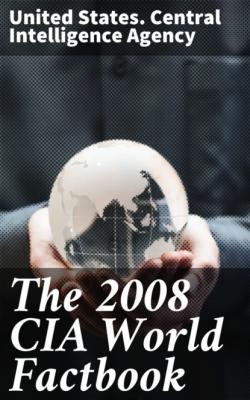The 2008 CIA World Factbook. United States. Central Intelligence Agency
Чтение книги онлайн.
Читать онлайн книгу The 2008 CIA World Factbook - United States. Central Intelligence Agency страница 395
 Guinean(s) adjective: Guinean
Guinean(s) adjective: Guinean
Ethnic groups:
African 99% (includes Balanta 30%, Fula 20%, Manjaca 14%, Mandinga 13%, Papel 7%), European and mulatto less than 1%
Religions:
Muslim 50%, indigenous beliefs 40%, Christian 10%
Languages:
Portuguese (official), Crioulo, African languages
Literacy:
definition: age 15 and over can read and write total population: 42.4% male: 58.1% female: 27.4% (2003 est.)
School life expectancy (primary to tertiary education):
total: 5 years male: 7 years female: 4 years (2001)
Education expenditures:
5.2% of GDP (1999)
Government
Guinea-Bissau
Country name:
conventional long form: Republic of Guinea-Bissau conventional short form: Guinea-Bissau local long form: Republica da Guine-Bissau local short form: Guine-Bissau former: Portuguese Guinea
Government type:
republic
Capital:
name: Bissau geographic coordinates: 11 51 N, 15 35 W time difference: UTC 0 (5 hours ahead of Washington, DC during Standard Time)
Administrative divisions:
9 regions (regioes, singular - regiao); Bafata, Biombo, Bissau, Bolama, Cacheu, Gabu, Oio, Quinara, Tombali; note - Bolama may have been renamed Bolama/Bijagos
Independence:
24 September 1973 (declared); 10 September 1974 (from Portugal)
National holiday:
Independence Day, 24 September (1973)
Constitution:
16 May 1984; amended 4 May 1991, 4 December 1991, 26 February 1993, 9 June 1993, and in 1996
Legal system:
based on French civil law; accepts compulsory ICJ jurisdiction
Suffrage:
18 years of age; universal
Executive branch:
chief of state: President Joao Bernardo 'Nino' VIEIRA (since 1 October 2005) head of government: Prime Minister Carlos CORREIA (since 5 August 2008) cabinet: NA elections: president elected by popular vote for a five-year term (no term limits); election last held 24 July 2005 (next to be held in 2010); prime minister appointed by the president after consultation with party leaders in the legislature election results: Joao Bernardo VIEIRA elected president; percent of vote, second ballot - Joao Bernardo VIEIRA 52.4%, Malam Bacai SANHA 47.6%
Legislative branch:
unicameral National People's Assembly or Assembleia Nacional Popular (100 seats; members are elected by popular vote to serve four-year terms) elections: last held 28 March 2004 (next to be held 16 November 2008) election results: percent of vote by party - PAIGC 31.5%, PRS 24.8%, PUSD 16.1%, UE 4.1%, APU 1.3%, 13 other parties 22.2%; seats by party - PAIGC 45, PRS 35, PUSD 17, UE 2, APU 1
Judicial branch:
Supreme Court or Supremo Tribunal da Justica (consists of nine justices appointed by the president and serve at his pleasure; final court of appeals in criminal and civil cases); Regional Courts (one in each of nine regions; first court of appeals for Sectoral Court decisions; hear all felony cases and civil cases valued at more than $1,000); 24 Sectoral Courts (judges are not necessarily trained lawyers; they hear civil cases valued at less than $1,000 and misdemeanor criminal cases)
Political parties and leaders:
African Party for the Independence of Guinea-Bissau and Cape Verde
or PAIGC [Carlos GOMES Junior]; Party for Social Renewal or PRS
[Kumba YALA]; Democratic Social Front or FDS; Electoral Union or UE;
Guinea-Bissau Civic Forum/Social Democracy or FCGSD [Antonieta Rosa
GOMES]; Guinea-Bissau Democratic Party or PDG; Guinea-Bissau
Socialist Democratic Party or PDSG [Serifo BALDE]; Labor and
Solidarity Party or PST [Iancuba INDJAI]; Party for Democratic
Convergence or PCD [Victor MANDINGA]; Party for Renewal and Progress
or PRP; Progress Party or PP [Ibrahima SOW]; Union for Change or UM
[Amine SAAD]; Union of Guinean Patriots or UPG [Francisca VAZ];
United Platform or UP (coalition formed by PCD, FDS, FLING, and
RGB-MB); United Popular Alliance or APU; United Social Democratic
Party or PUSD
Political pressure groups and leaders:
NA
International organization participation:
ACP, AfDB, AU, CPLP, ECOWAS, FAO, FZ, G-77, IBRD, ICAO, ICCt
(signatory), ICRM, IDA, IDB, IFAD, IFC, IFRCS, ILO, IMF, IMO,
Interpol, IOC, IOM, ITSO, ITU, ITUC, MIGA, NAM, OIC, OIF, OPCW, UN,
UNCTAD, UNESCO, UNIDO, Union Latina, UNWTO, UPU, WADB (regional),
WAEMU, WFTU, WHO, WIPO, WMO, WTO
Diplomatic representation in the US:
chief of mission: none; note - Guinea-Bissau does not have official representation in Washington, DC
Diplomatic representation from the US:
the US Embassy suspended operations on 14 June 1998 in the midst of violent conflict between forces loyal to then President VIEIRA and military-led junta; the US Ambassador to Senegal is accredited to Guinea-Bissau
Flag description:
two equal horizontal bands of yellow (top) and green with a vertical red band on the hoist side; there is a black five-pointed star centered in the red band; uses the popular pan-African colors of Ethiopia
Economy
Guinea-Bissau
Economy - overview:
One of the five poorest countries in the world, Guinea-Bissau depends mainly